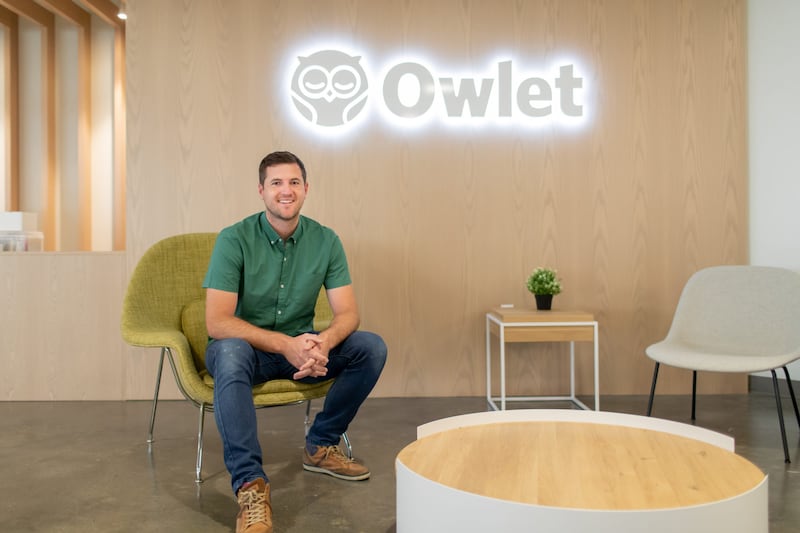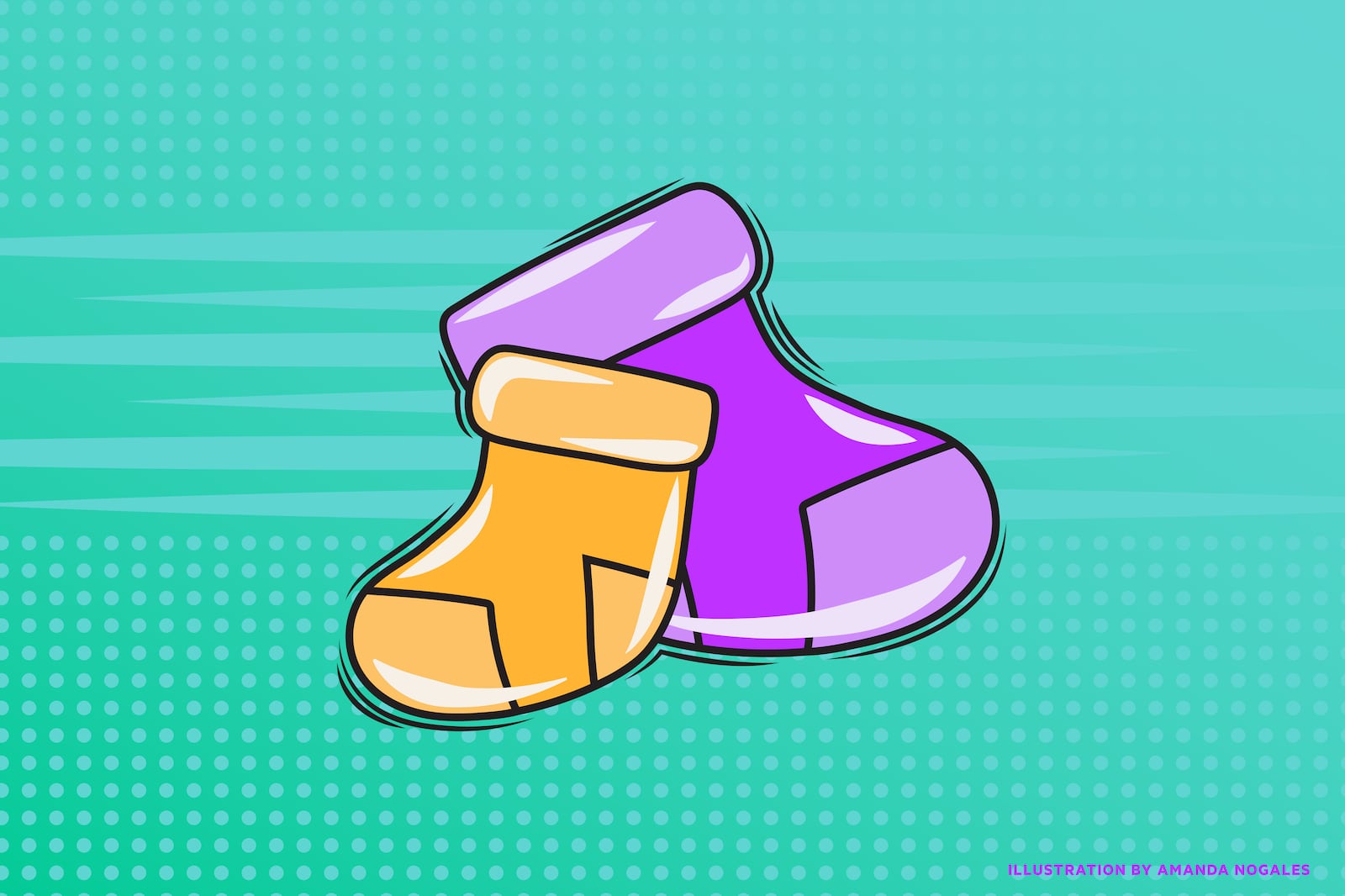The Founder Series is a column by and about Utah founders and how they got to where they are today. Click here to read past articles in the series.
For as long as I can remember, I’ve been an entrepreneur. I grew up in Farmington, Utah and started my own paintball company when I was 13 years old. My dad would pick up Co2 canisters on the way home from work so that I could host paintball games in our backyard for my friends (who were also my customers). In college, I even started my own tiling business. I was always in pursuit of solving a problem, trying something new, and having the desire to run my own company. In fact, it was while I attended school at Brigham Young University that I stumbled into what would become Owlet, and I’ve been there ever since.
Founding Owlet
When my wife and I welcomed our first child eight years ago, we became the doctor, the nurse, the dietitian, the sleep trainer, and more the second we left the hospital. All we had was a thermometer and the rest was just up to us. I received more training to get my driver’s license than I did to become a parent. This is the reality for most parents, and it’s what inspired me to co-found Owlet—a company that would create a smart, connected nursery ecosystem that focuses on helping parents provide better care at home.
I firmly believe that every family deserves the peace of mind that comes from having insights into how their little one is doing, and I wanted to create the technology needed to do it. So I teamed up with five of my good friends to create a wearable sock monitor that tracks things like heart rate, oxygen level, and sleep trends while Baby slept.
For a year and a half, we worked hard without paychecks on an unsuccessful prototype of the monitoring device—ultimately using the full $100,000 startup accelerator Techstars had granted us, 2,000 already-manufactured socks, and our pre-order sales revenues. At one point, I had to sit down with my other co-founders and determine how much longer the business (and ourselves) could hang on without profits or a paycheck.
We all wanted to keep working, regardless of the current financial situation, and we managed to scrape enough money to keep things going for another six months while working on a new prototype. Things also began looking up financially, as we ended up securing a $2 million seed round.
Once we HAD a successful prototype, things got even more complicated when we discovered that it cost us $1,000 to acquire a customer (the product was $250 at the time—so we had to spend 4x the cost just to get them to buy) via Google. We even had a manufacturing partner quit on us because they didn’t believe in the future of the company.
Accepting failure
Kathryn Schulz, who is billed as a “wrongologist,” said this and it’s a quote that has long stuck with me: “To err is to wander, and wandering is the way we discover the world; and, lost in thought, it is also the way we discover ourselves. Being right might be gratifying, but in the end, it is static, a mere statement. Being wrong is hard and humbling, and sometimes even dangerous, but in the end it is a journey, and a story.”
At a glance, it might be easy for some to look at Owlet, which we just took public last year on the New York Stock Exchange, and think that we found success easily. However, in case my story above didn’t tip you off— we’ve definitely had our share of really hard challenges and failures along the way.
I share all of this to get to a piece of advice: Failure is hard, it hurts and it can be defeating. Allow yourself the time to mourn and accept the failure, but don’t let the failure pass without seeking to learn and understand more from it.
At Owlet, failures have led us to a better path in the long run. When we had to throw away 2,000 units and ask employees to hold on paychecks, it led us to introduce a more reliable monitoring system that would go on to be named the best baby monitor several years in a row.
With our high cost-per-acquisition in marketing, it pushed us to explore new ways to advertise and we found huge success in video marketing. When our manufacturing partner walked away, it forced us to find a new vendor that turned out to be extremely committed to our mission and had connections that resulted in lower manufacturing costs.
Without some of the failures in my career and while starting Owlet, the company might not exist or be what it is today. I can honestly say that I am thankful for the struggles and failures along the way. It may be hard to feel that way in the thick of it, but now as I have the opportunity to mentor young entrepreneurs and early-stage founders, I offer that insight and experience and hope to change the way we think about failure.

Rallying around a mission
Ultimately, when I look back on my journey as a co-founder, I can say with confidence that some of the best decisions I’ve made have been in hiring. With our mission to create a smart, connected nursery ecosystem that focuses on helping parents provide better care at home, we’ve been fortunate enough to recruit some of the best and brightest minds. Having a solid team is one of the most important things for any business, and I would be remiss if I didn’t include my team here.
Our entire team truly believes that every family deserves the peace of mind that comes from having insights into how their little one is doing. And we are committed to doing with our technology and connected nursery ecosystem, and every day, we make important steps toward that. Every single person on our team is contributing to that, and ultimately toward the greater good of every family. “Every baby” is something you’ll hear often in Owlet meetings, as a reminder of why we’re here— and helps make even on the hardest of days (which all businesses will experience, regardless of your mission) a little bit better.
Additionally, in line with our mission, we’re privileged to support some really amazing parent-led nonprofit organizations. We sincerely want to help. We partner with dozens of incredible parent-led nonprofits across the US that share the same mission — bringing Owlet technology to every baby and every family. Many of these groups help low-income families access Owlet products that otherwise wouldn’t be able to get a Sock or a Cam. For every one Owlet product these organizations purchase, we match it with two, so they’re able to donate three for every one they purchase.
Last year, the theme of our listing on the New York Stock Exchange was “this one’s for the babies,” where we also announced that we’d surpassed 1 million babies monitored. We also announced our commitment to donate $1 million to support families and these amazing nonprofit groups.
A few final words
I’ve shared a lot in this article, and if I had to leave you with just three pieces of advice, I’d say:
- Focus on serving a real customer need. The heart of any great business is the problem it’s solving for its customers. When you solve a real customer problem, it becomes the foundation of your mission, your culture, and your business. It will help you prioritize during difficult times.
- Leverage the broader entrepreneur ecosystem in, and out of, Utah. Utah has an amazing business and entrepreneur network — please take advantage of it. There’s an even bigger network that Utah founders should participate in outside of Utah. Don’t limit yourself to just what’s around you. Look for the very best, and go for it. (Chances are, there is someone in the Utah network that can connect you — I’ve found there are very few degrees of separation in many cases. Take advantage of it!)
- It’s all about the people. How does a student entrepreneur go from starting a company in a garage to listing on the NYSE? Finding really great people and getting them excited about the mission and vision. Don’t limit yourself on who you can hire or get involved. Find the right people for your business and get them excited.

